云南省中考英语试题(答案)
- 格式:doc
- 大小:249.50 KB
- 文档页数:15
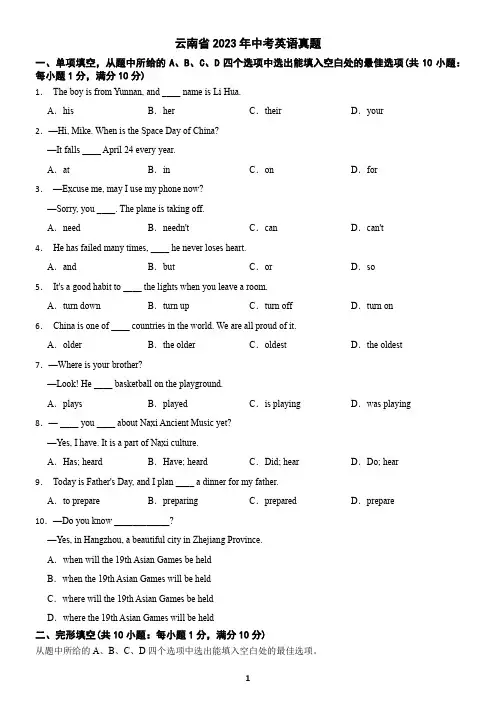
云南省2023年中考英语真题一、单项填空,从题中所给的A、B、C、D四个选项中选出能填入空白处的最佳选项(共10小题:每小题1分,满分10分)1.The boy is from Yunnan, and ____ name is Li Hua.A.his B.her C.their D.your2.—Hi, Mike. When is the Space Day of China?—It falls ____ April 24 every year.A.at B.in C.on D.for3.—Excuse me, may I use my phone now?—Sorry, you ____. The plane is taking off.A.need B.needn't C.can D.can't4.He has failed many times, ____ he never loses heart.A.and B.but C.or D.so5.It's a good habit to ____ the lights when you leave a room.A.turn down B.turn up C.turn off D.turn on6.China is one of ____ countries in the world. We are all proud of it.A.older B.the older C.oldest D.the oldest7.—Where is your brother?—Look! He ____ basketball on the playground.A.plays B.played C.is playing D.was playing8.— ____ you ____ about Naxi Ancient Music yet?—Yes, I have. It is a part of Naxi culture.A.Has; heard B.Have; heard C.Did; hear D.Do; hear9.Today is Father's Day, and I plan ____ a dinner for my father.A.to prepare B.preparing C.prepared D.prepare10.—Do you know ____________?—Yes, in Hangzhou, a beautiful city in Zhejiang Province.A.when will the 19th Asian Games be heldB.when the 19th Asian Games will be heldC.where will the 19th Asian Games be heldD.where the 19th Asian Games will be held二、完形填空(共10小题:每小题1分,满分10分)从题中所给的A、B、C、D四个选项中选出能填入空白处的最佳选项。
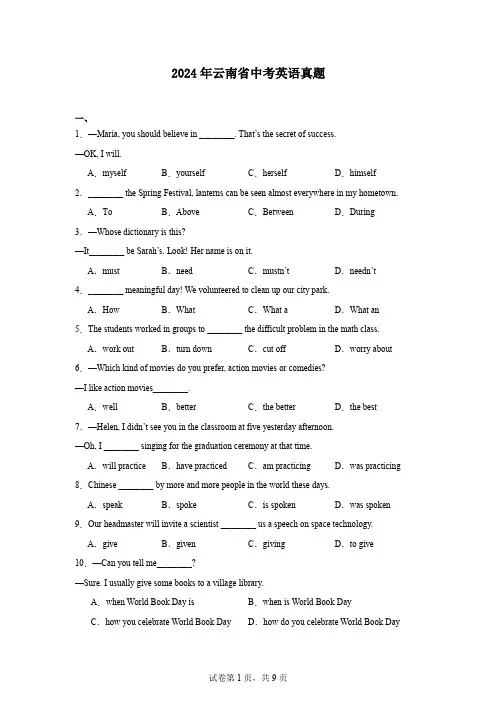
2024年云南省中考英语真题一、1.—Maria, you should believe in ________. That’s the secret of success.—OK, I will.A.myself B.yourself C.herself D.himself 2.________ the Spring Festival, lanterns can be seen almost everywhere in my hometown.A.Τo B.Above C.Between D.During 3.—Whose dictionary is this?—It________ be Sarah’s. Look! Her name is on it.A.must B.need C.mustn’t D.needn’t 4.________ meaningful day! We volunteered to clean up our city park.A.How B.What C.What a D.What an 5.The students worked in groups to ________ the difficult problem in the math class.A.work out B.turn down C.cut off D.worry about 6.—Which kind of movies do you prefer, action movies or comedies?—I like action movies________.A.well B.better C.the better D.the best 7.—Helen, I didn’t see you in the classroom at five yesterday afternoon.—Oh, I ________ singing for the graduation ceremony at that time.A.will practice B.have practiced C.am practicing D.was practicing 8.Chinese ________ by more and more people in the world these days.A.speak B.spoke C.is spoken D.was spoken 9.Our headmaster will invite a scientist ________ us a speech on space technology.A.give B.given C.giving D.to give 10.—Can you tell me________?—Sure. I usually give some books to a village library.A.when World Book Day is B.when is World Book DayC.how you celebrate World Book Day D.how do you celebrate World Book Day从题中所给的A、B、C、D四个选项中选出能填入空白处的最佳选项。
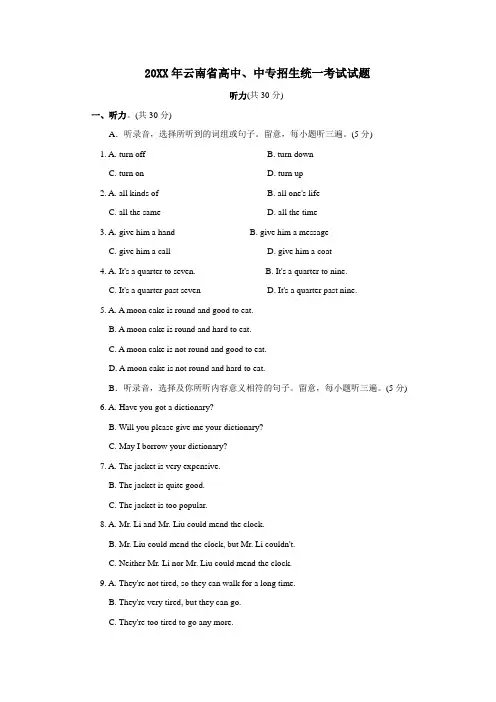
20XX年云南省高中、中专招生统一考试试题听力(共30分)一、听力。
(共30分)A.听录音,选择所听到的词组或句子。
留意,每小题听三遍。
(5分)1. A. turn off B. turn downC. turn onD. turn up2. A. all kinds of B. all one's lifeC. all the sameD. all the time3. A. give him a hand B. give him a messageC. give him a callD. give him a coat4. A. It's a quarter to seven. B. It's a quarter to nine.C. It's a quarter past sevenD. It's a quarter past nine.5. A. A moon cake is round and good to eat.B. A moon cake is round and hard to eat.C. A moon cake is not round and good to eat.D. A moon cake is not round and hard to eat.B.听录音,选择及你所听内容意义相符的句子。
留意,每小题听三遍。
(5分)6. A. Have you got a dictionary?B. Will you please give me your dictionary?C. May I borrow your dictionary?7. A. The jacket is very expensive.B. The jacket is quite good.C. The jacket is too popular.8. A. Mr. Li and Mr. Liu could mend the clock.B. Mr. Liu could mend the clock, but Mr. Li couldn't.C. Neither Mr. Li nor Mr. Liu could mend the clock.9. A. They're not tired, so they can walk for a long time.B. They're very tired, but they can go.C. They're too tired to go any more.10. A. They enjoyed themselves in the park last week.B. They enjoy themselves in the zoo every week.C. They will enjoy themselves in the park this week.C.听对话,依据所听内容答复问题。
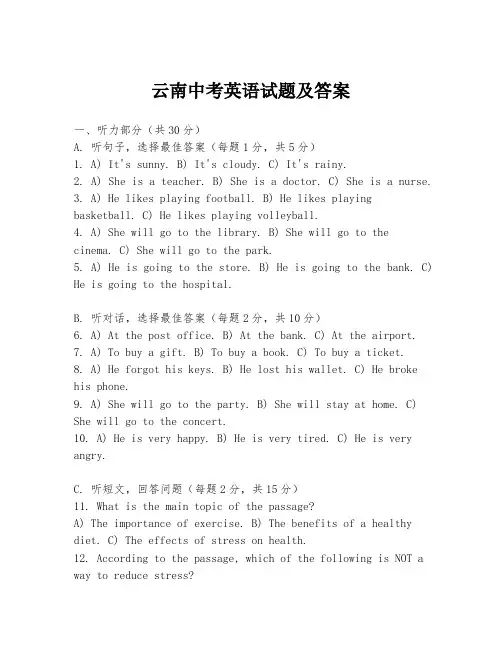
云南中考英语试题及答案一、听力部分(共30分)A. 听句子,选择最佳答案(每题1分,共5分)1. A) It's sunny. B) It's cloudy. C) It's rainy.2. A) She is a teacher. B) She is a doctor. C) She is a nurse.3. A) He likes playing football. B) He likes playing basketball. C) He likes playing volleyball.4. A) She will go to the library. B) She will go to the cinema. C) She will go to the park.5. A) He is going to the store. B) He is going to the bank. C) He is going to the hospital.B. 听对话,选择最佳答案(每题2分,共10分)6. A) At the post office. B) At the bank. C) At the airport.7. A) To buy a gift. B) To buy a book. C) To buy a ticket.8. A) He forgot his keys. B) He lost his wallet. C) He broke his phone.9. A) She will go to the party. B) She will stay at home. C) She will go to the concert.10. A) He is very happy. B) He is very tired. C) He is very angry.C. 听短文,回答问题(每题2分,共15分)11. What is the main topic of the passage?A) The importance of exercise. B) The benefits of a healthy diet. C) The effects of stress on health.12. According to the passage, which of the following is NOT a way to reduce stress?A) Listening to music. B) Going for a walk. C) Drinking alcohol.13. What does the speaker suggest doing to improve sleep quality?A) Eating less sugar. B) Taking a hot bath. C) Using asleeping pill.14. What is the relationship between the speaker and the person they are talking about?A) Friends. B) Colleagues. C) Family members.15. What advice does the speaker give at the end of the passage?A) To take up a hobby. B) To spend more time with family. C) To seek professional help if needed.二、阅读理解(共40分)A. 阅读理解选择题(每题2分,共20分)16-20 [文章一]16. What is the main idea of the passage?A) The history of the bicycle. B) The benefits of cycling for health. C) The development of cycling as a sport.17. According to the author, why is cycling popular?A) It's cheap and convenient. B) It's a good way to exercise.C) It's environmentally friendly.18. What does the author suggest about cycling in the city?A) It's dangerous due to traffic. B) It's a good alternativeto driving. C) It's not allowed in some areas.19. What is the author's opinion on cycling for children?A) It's too risky. B) It's a good way to learn responsibility.C) It's not as fun as playing video games.20. What does the author recommend for new cyclists?A) To always wear a helmet. B) To start with short rides. C)To join a cycling club.21-25 [文章二]21. What is the purpose of the article?A) To introduce a new technology. B) To discuss the impact of technology on education. C) To promote a new educational app.22. According to the article, which of the following is NOT an advantage of using technology in the classroom?A) It makes learning more interactive. B) It saves time for teachers. C) It increases the cost of education.23. What does the author suggest about the use of technology in education?A) It should be limited. B) It should be encouraged. C) It should be avoided.24. What is the author's view on the role of technology in the future of education?A) It will replace teachers. B) It will enhance teaching methods. C) It will make learning less personal.25. What does the article conclude about the use of technology in education?A) It has mixed results. B) It is essential for modern education. C) It is not necessary for effective learning.B. 阅读理解填空题(每题1分,共10分)26-35 [文章三]26. The author believes that success in life requires a combination of ___ and hard work.27. The first step to achieving one's goals is to ___.28. According to the passage, setting realistic goals is important because ___.29. The author suggests that ___ can help maintain motivation.30. One should。
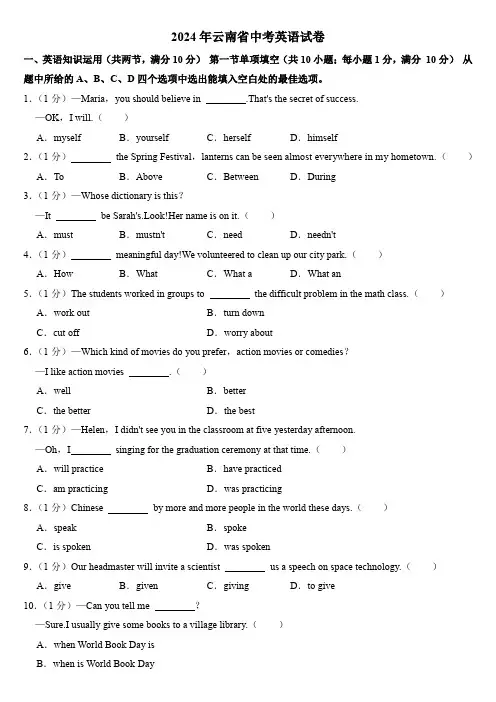
2024年云南省中考英语试卷一、英语知识运用(共两节,满分10分)第一节单项填空(共10小题;每小题1分,满分10分)从题中所给的A、B、C、D四个选项中选出能填入空白处的最佳选项。
1.(1分)—Maria,you should believe in .That's the secret of success.—OK,I will.()A.myself B.yourself C.herself D.himself2.(1分)the Spring Festival,lanterns can be seen almost everywhere in my hometown.()A.To B.Above C.Between D.During3.(1分)—Whose dictionary is this?—It be Sarah's.Look!Her name is on it.()A.must B.mustn't C.need D.needn't4.(1分)meaningful day!We volunteered to clean up our city park.()A.How B.What C.What a D.What an5.(1分)The students worked in groups to the difficult problem in the math class.()A.work out B.turn downC.cut off D.worry about6.(1分)—Which kind of movies do you prefer,action movies or comedies?—I like action movies .()A.well B.betterC.the better D.the best7.(1分)—Helen,I didn't see you in the classroom at five yesterday afternoon.—Oh,I singing for the graduation ceremony at that time.()A.will practice B.have practicedC.am practicing D.was practicing8.(1分)Chinese by more and more people in the world these days.()A.speak B.spokeC.is spoken D.was spoken9.(1分)Our headmaster will invite a scientist us a speech on space technology.()A.give B.given C.giving D.to give10.(1分)—Can you tell me ?—Sure.I usually give some books to a village library.()A.when World Book Day isB.when is World Book DayC.how you celebrate World Book DayD.how do you celebrate World Book Day第二节完形填空(满分10分)从题中所给的A、B、C、D四个选项中选出能填入空白处的最佳选项。
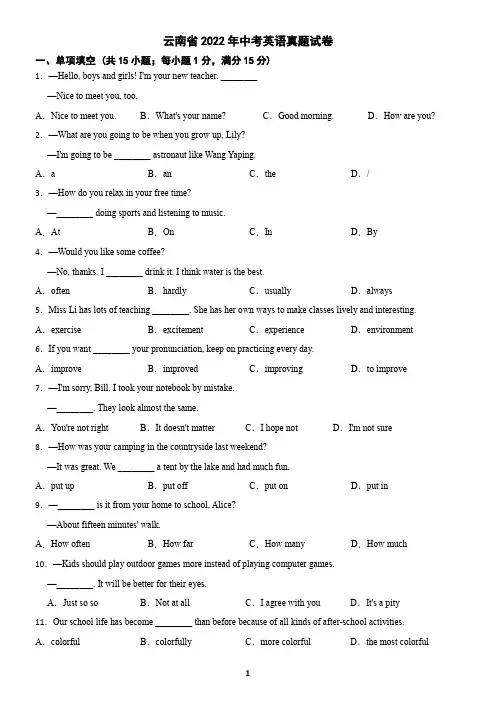
云南省2022年中考英语真题试卷一、单项填空 (共15小题;每小题1分,满分15分)1.—Hello, boys and girls! I'm your new teacher. ________—Nice to meet you, too.A.Nice to meet you.B.What's your name?C.Good morning.D.How are you? 2.—What are you going to be when you grow up, Lily?—I'm going to be ________ astronaut like Wang Yaping.A.a B.an C.the D./3.—How do you relax in your free time?—________ doing sports and listening to music.A.At B.On C.In D.By 4.—Would you like some coffee?—No, thanks. I ________ drink it. I think water is the best.A.often B.hardly C.usually D.always5.Miss Li has lots of teaching ________. She has her own ways to make classes lively and interesting. A.exercise B.excitement C.experience D.environment 6.If you want ________ your pronunciation, keep on practicing every day.A.improve B.improved C.improving D.to improve 7.—I'm sorry, Bill. I took your notebook by mistake.—________. They look almost the same.A.You're not right B.It doesn't matter C.I hope not D.I'm not sure 8.—How was your camping in the countryside last weekend?—It was great. We ________ a tent by the lake and had much fun.A.put up B.put off C.put on D.put in9.—________ is it from your home to school, Alice?—About fifteen minutes' walk.A.How often B.How far C.How many D.How much 10.—Kids should play outdoor games more instead of playing computer games.—________. It will be better for their eyes.A.Just so so B.Not at all C.I agree with you D.It's a pity 11.Our school life has become ________ than before because of all kinds of after-school activities. A.colorful B.colorfully C.more colorful D.the most colorful12.I advise you not to show ________ on the WeChat because it may cause trouble.A.anything personal B.personal anythingC.something personal D.personal something13.How time flies! I ________ a senior high school this September.A.enter B.entered C.will enter D.have entered14.For your safety, you mustn't get close to the train ________ it stops.A.while B.when C.since D.until15.—Your stamps are so fantastic. Could you please tell me ________?—Oh, I bought them in the post office next to the bank.A.why did you buy them B.where did you buy themC.why you bought them D.where you bought them二、完形填空 (共10小题;每小题1.5分,满分15分)从题中所给的A、B、C、D四个选项中选出能填入空白处的最佳选项。
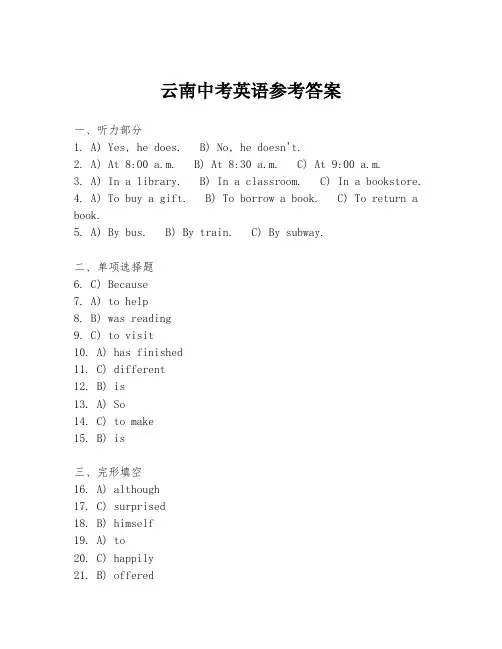
云南中考英语参考答案一、听力部分1. A) Yes, he does. B) No, he doesn't.2. A) At 8:00 a.m. B) At 8:30 a.m. C) At 9:00 a.m.3. A) In a library. B) In a classroom. C) In a bookstore.4. A) To buy a gift. B) To borrow a book. C) To return a book.5. A) By bus. B) By train. C) By subway.二、单项选择题6. C) Because7. A) to help8. B) was reading9. C) to visit10. A) has finished11. C) different12. B) is13. A) So14. C) to make15. B) is三、完形填空16. A) although17. C) surprised18. B) himself19. A) to20. C) happily21. B) offered22. A) because23. D) important24. B) to25. C) but四、阅读理解A)26. B) A new type of robot.27. A) It can help people with their daily life.28. C) It can recognize faces and remember people.29. D) It can understand what people say.30. A) They are amazed by the robot's abilities.B)31. B) To show how much people care about the environment.32. A) By making a list of things to do.33. C) To make people realize the importance of protecting the environment.34. D) By doing small things in their daily life.35. A) It makes people feel good about themselves.C)36. D) The importance of taking risks.37. B) By giving examples of successful people.38. A) To encourage people to take risks.39. C) Success is not the only measure of success.40. B) To be brave and take risks.五、任务型阅读41. E) The writer's first experience of being a volunteer.42. A) The writer's feelings about the children.43. C) The writer's opinion on helping others.44. B) The writer's suggestion for the readers.45. D) The writer's hope for the future.六、书面表达假如你是李华,你的英国朋友Tom将来中国旅游,他对中国的传统文化非常感兴趣。
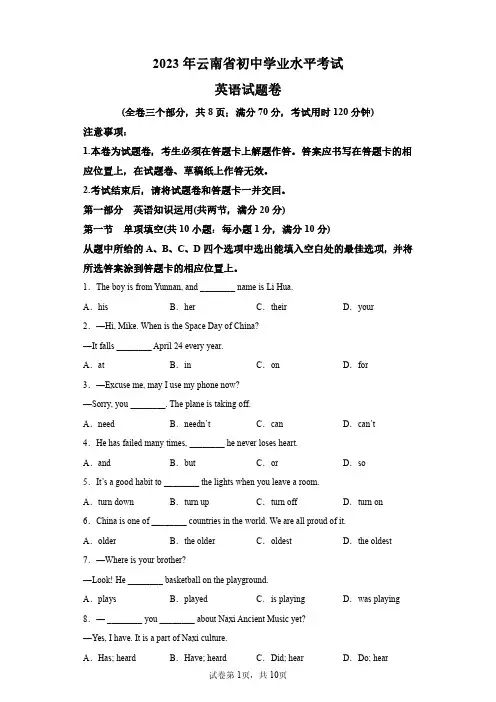
2023年云南省初中学业水平考试英语试题卷(全卷三个部分,共8页;满分70分,考试用时120分钟)注意事项:1.本卷为试题卷,考生必须在答题卡上解题作答。
答案应书写在答题卡的相应位置上,在试题卷、草稿纸上作答无效。
2.考试结束后,请将试题卷和答题卡一并交回。
第一部分英语知识运用(共两节,满分20分)第一节单项填空(共10小题:每小题1分,满分10分)从题中所给的A、B、C、D四个选项中选出能填入空白处的最佳选项,并将所选答案涂到答题卡的相应位置上。
1.The boy is from Yunnan,and________name is Li Hua.A.his B.her C.their D.your 2.—Hi,Mike.When is the Space Day of China?—It falls________April24every year.A.at B.in C.on D.for 3.—Excuse me,may I use my phone now?—Sorry,you________.The plane is taking off.A.need B.needn’t C.can D.can’t4.He has failed many times,________he never loses heart.A.and B.but C.or D.so5.It’s a good habit to________the lights when you leave a room.A.turn down B.turn up C.turn off D.turn on 6.China is one of________countries in the world.We are all proud of it.A.older B.the older C.oldest D.the oldest 7.—Where is your brother?—Look!He________basketball on the playground.A.plays B.played C.is playing D.was playing 8.—________you________about Naxi Ancient Music yet?—Yes,I have.It is a part of Naxi culture.A.Has;heard B.Have;heard C.Did;hear D.Do;hear18.A.carefully B.politely C.hardly D.sadly 19.A.look up B.worry about C.give out D.put up 20.A.terrible B.common C.special D.white第二部分阅读理解(共三节,满分30分)第一节(共5小题:每小题1.5分,满分7.5分)根据短文内容,判断正误(正确“T”,错误“F”),并将所选答案涂到答题卡的相应位置上。
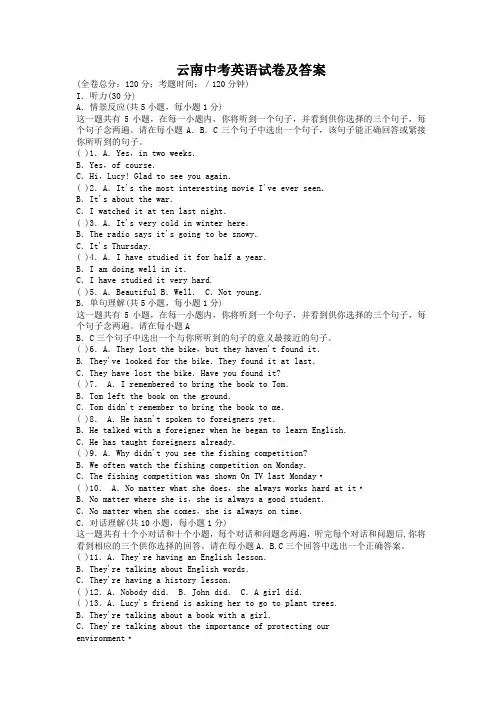
云南中考英语试卷及答案(全卷总分:120分;考题时间:/120分钟)I.听力(30分)A.情景反应(共5小题,每小题1分)这一题共有5小题,在每一小题内,你将听到一个句子,并看到供你选择的三个句子,每个句子念两遍。
请在每小题A.B.C三个句子中选出一个句子,该句子能正确回答或紧接你所听到的句子。
( )1.A.Yes,in two weeks.B.Yes,of course.C.Hi,Lucy! Glad to see you again.( )2.A.It's the most interesting movie I've ever seen.B.It's about the war.C.I watched it at ten last night.( )3.A.It's very cold in winter here.B.The radio says it's going to be snowy.C.It's Thursday.( )4.A.I have studied it for half a year.B.I am doing well in it.C.I have studied it very hard.( )5.A.Beautiful B.Well. C.Not young.B.单句理解(共5小题,每小题1分)这一题共有5小题,在每一小题内,你将听到一个句子,并看到供你选择的三个句子,每个句子念两遍。
请在每小题AB.C三个句子中选出一个与你所听到的句子的意义最接近的句子。
( )6.A.They lost the bike,but they haven't found it.B. They've 1ooked for the bike.They found it at last.C.They have lost the bike.Have you found it?( )7. A.I remembered to bring the book to Tom.B.Tom left the book on the ground.C.Tom didn't remember to bring the book to me.( )8. A.He hasn't spoken to foreigners yet.B.He talked with a foreigner when he began to learn English.C.He has taught foreigners already.( )9.A.Why didn't you see the fishing competition?B.We often watch the fishing competition on Monday.C.The fishing competition was shown 0n TV last Monday·( )10. A.No matter what she does,she always works hard at it·B.No matter where she is,she is always a good student.C.No matter when she comes,she is always on time.C.对话理解(共10小题,每小题1分)这一题共有十个小对话和十个小题,每个对话和问题念两遍,听完每个对话和问题后,你将看到相应的三个供你选择的回答。
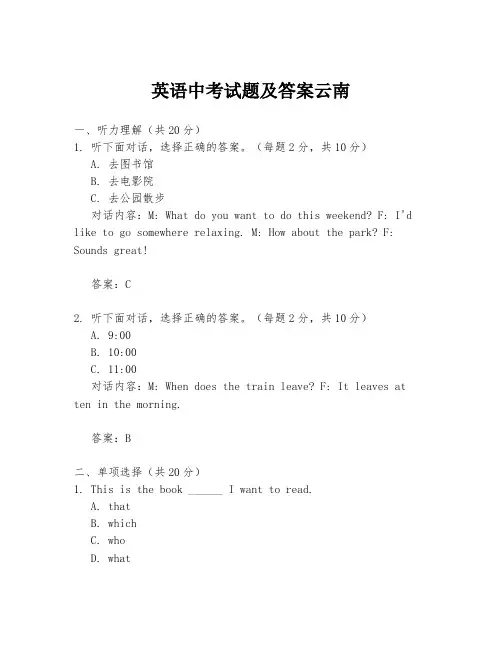
英语中考试题及答案云南一、听力理解(共20分)1. 听下面对话,选择正确的答案。
(每题2分,共10分)A. 去图书馆B. 去电影院C. 去公园散步对话内容:M: What do you want to do this weekend? F: I'd like to go somewhere relaxing. M: How about the park? F: Sounds great!答案:C2. 听下面对话,选择正确的答案。
(每题2分,共10分)A. 9:00B. 10:00C. 11:00对话内容:M: When does the train leave? F: It leaves at ten in the morning.答案:B二、单项选择(共20分)1. This is the book ______ I want to read.A. thatB. whichC. whoD. what答案:A2. She ______ to the Great Wall twice.A. has beenB. had beenC. wentD. goes答案:A三、完形填空(共20分)阅读下面的短文,从每题所给的选项中选择正确答案。
(每题2分,共20分)In ancient times, people used to think the Earth was flat. However, today we know that the Earth is round. This discovery was made possible by the efforts of many scientists over time. They studied the stars, the moon, and the sun, and made careful observations.1. People used to think the Earth was ______.A. squareB. flatC. triangularD. round答案:B2. The discovery of the Earth's shape was due to ______.A. luckB. chanceC. scientists' effortsD. technology答案:C四、阅读理解(共20分)阅读下面的短文,然后回答1-5题。
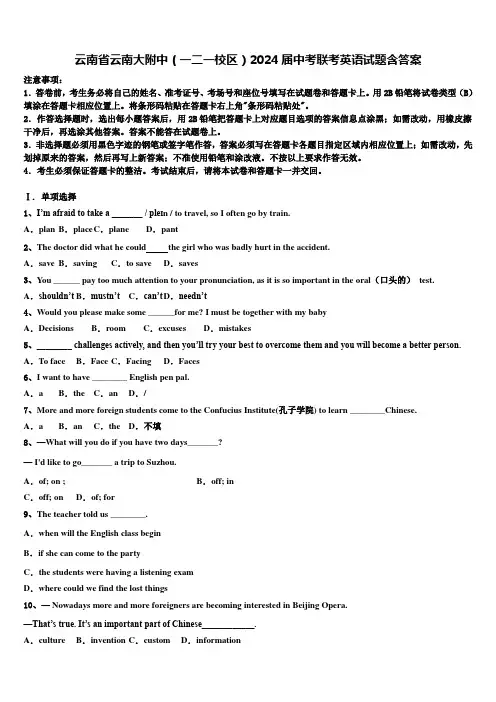
云南省云南大附中(一二一校区)2024届中考联考英语试题含答案注意事项:1.答卷前,考生务必将自己的姓名、准考证号、考场号和座位号填写在试题卷和答题卡上。
用2B铅笔将试卷类型(B)填涂在答题卡相应位置上。
将条形码粘贴在答题卡右上角"条形码粘贴处"。
2.作答选择题时,选出每小题答案后,用2B铅笔把答题卡上对应题目选项的答案信息点涂黑;如需改动,用橡皮擦干净后,再选涂其他答案。
答案不能答在试题卷上。
3.非选择题必须用黑色字迹的钢笔或签字笔作答,答案必须写在答题卡各题目指定区域内相应位置上;如需改动,先划掉原来的答案,然后再写上新答案;不准使用铅笔和涂改液。
不按以上要求作答无效。
4.考生必须保证答题卡的整洁。
考试结束后,请将本试卷和答题卡一并交回。
Ⅰ. 单项选择1、I’m afraid to take a _______ / pleɪn / to travel, so I often go by train.A.plan B.place C.plane D.pant2、The doctor did what he could the girl who was badly hurt in the accident.A.save B.saving C.to save D.saves3、You ______ pay too much attention to your pronunciation, as it is so important in the oral(口头的)test. A.shouldn’t B.mustn’t C.can’t D.needn’t4、Would you please make some ______for me? I must be together with my babyA.Decisions B.room C.excuses D.mistakes5、________ challenges actively, and then you’ll try your best to overcome them and you will become a better person. A.To face B.Face C.Facing D.Faces6、I want to have ________ English pen pal.A.a B.the C.an D./7、More and more foreign students come to the Confucius Institute(孔子学院) to learn ________Chinese.A.a B.an C.the D.不填8、—What will you do if you have two days_______?— I'd like to go_______ a trip to Suzhou.A.of; on ; B.off; inC.off; on D.of; for9、The teacher told us ________.A.when will the English class beginB.if she can come to the partyC.the students were having a listening examD.where could we find the lost things10、— Nowadays more and more foreigners are becoming interested in Beijing Opera.—That’s true. It’s an important part of Chinese____________.A.culture B.invention C.custom D.informationⅡ. 完形填空11、Poor Jennie sat at her window. She wasn’t able to go to school because an illness made it difficult for her to walk. She 1 out at the street with a look of tiredness on her face.“Oh, dear, what a long and 2 day it will be!” She looked sad and bored. She put her pale face against the3 of the window, he took off his hat and gave her a bright and friendly smile.“What a nice boy he is !” Jennie said to 4 , as he ran out of her eyes. “I am so glad he goes down this road on his way to school every day. When he smiles, it seems like having the sunshine.”The boy didn’t know how much 5 he had done in making a pleasant day out of a lonely one for a sick little girl.“Mother,” said the boy, George West, 6 he came home from school the other day, “I can’t help thinking about that poor little girl that I told you about. She looks so tired. I smiled at her again and talked with her today. I wish I could do something for her.”“She told me they used to live on a farm. But her father died, and her mother was ill for so long that the 7was all gone. Then her mother had to sell the farm and 8 to ou r city.”“ 9 didn’t the girl go to school?” Mother asked in surprise.“Because she can’t walk.” said the boy, 10 , “My father must give them some money, so they can go back to their 11 .”“No,” said the mother, “he cannot do that, and they would not want him to. But maybe we can find some other ways to 12 them.”“Tomorrow I am going to take Jennie some grapes.” the boy said.“I will put some of pears into your basket, and go with you. But there is one thing we can 13 give, and sometimes it does more good than nice things to eat, or 14 money.”“What is that, Mom?” Then he guessed, “ Smiles!” “Y es ,”answered his mother, ”and it is a good plan to throw in a kind word or two with those 15 when you can.”1.A.found B.looked C.hung D.went2.A.boring B.interesting C.exciting D.relaxing3.A.door B.wall C.glass D.desk4.A.myself B.herself C.himself D.yourself5.A.upset B.terrible C.serious D.good6.A.unless B.if C.before D.after7.A.money B.water C.animal D.car8.A.built B.passed C.moved D.sent9.A.Who B.Why C.When D.How10.A.early B.sadly C.luckily D.truly11.A.farm B.city C.school D.street12.A.cheat B.thank C.teach D.help13.A.hardly B.never C.always D.seldom14.A.yet B.still C.even D.almost15.A.smiles B.clothes C.games D.lettersⅢ. 语法填空12、Many students have hobbies, such as reading, painting, growing vegetables in their gardens, and looking 1.animals. Some hobbies are relaxing and others are creative(有创造性的). Hobbies can make you 2.(grow) as a person,develop your interests and help you learn new skills.David Smith is a student. His hobby is writing. 3.the summer of 2000, he spent four weeks on a summer camp. As well as the usual activities, such 4.sailing, climbing and mounting biking, there was a writing workshop with a profession writer. “She asked us 5.(imagine) that we were in a story. Then we wrote about our experiences at the camp.”In senior high school David 6.a story about teenage life. Many teenagers love his book, and as a result, David has become a 7.(success) young writer.David has been very lucky8.his hobby has brought him enjoyment and success to 9.(he). But he is also interested in many other things. “I like playing volleyball, too.” says David. “I spend some of my free tim e 10.volleyball for my school team. M aybe I’ll write more books in the future, but I’m not sure.”There are many other interesting things to do in life, and we should try to do something new or different.Ⅳ. 阅读理解A13、On December 14,2017,we were sorry to hear that Yu Guangzhong, a famous poet died of illness in Taiwan. He was born in Nanjing in 1928. His mother's hometown is in Wujin,Changzhou. So he called himself a southern person. Later, he went to Taiwan. In 1952 he graduated from Taiwan University. Then he graduated from University of LOWA in 1959. He taught at Soochow University, Normal University, Taiwan University , and Chengchi University. He got a lot of prizes in literature(文学),such as.Wu San lien Literature Prize, China Times Award, Golden Tripod,National Arts Award and all the major(主要的)Awards in Taiwan. He is famous both in Taiwan and in Mainland.He was in Taiwan, but he always missed his hometown in Mainland. In one of his poems Nostalgia(乡愁) ,he showed hisfeeling of homesickness. Let's enjoy his famous poem Nostalgia.NostalgiaWhen I was young,But later on,Nostalgia was a tiny, tiny stamp. Nostalgia was a low,low grave.Me on this side,Me on this side,Mother on the other side. And my mother ;inside.When I grew up,And at present,Nostalgia was a narrow boat ticket. Nostalgia becomes a shallow strait.Me on this side,Me on this side,Bride on the other side. Mainland on the other side.1.Yu wrote the poem Nostalgia because he wanted to .A.find his boat ticket B.show his love to his brideC.miss his mother in Wujin . D.miss his hometown in Mainland2.From the second paragraph , we can learn about .A.Yu's achievements B.Yu's school IifeC.Yu's homesickness D.Yu's working time3.一In the poem,"stamp"," ticket","grave" and "strait" represent the poet's .A.wishes for Taiwan and the Mainland B.favourite things in different timesC.different feelings about homesickness D.good ideas'for coming back homeB14、Speed reading is a necessary skill in the Internet age. We skim over articles, e-mails and WeChat to try to get key words and the meaning of the text. With so much information through our electronic device (设备), it would be impossible to get through everything if we read word by word, line by line. But a new trend calls on people to enjoy reading slowly.A recent story from The Wall Street Journal reported on a book club in Wellington, New Zealand, where members meet in a cafe and turn off their smartphones. They sit in comfortable chairs and read in silence for an hour. Unlike traditional book clubs, the point of the slow reading club isn’t to share ideas about a certain book, but to get away from electronic devices and read in a quiet, relaxed environment.Slow readers, such as TheAtlantic’sMaura Kelly, say a regular reading habit sharpens the mind, improves attention, lowers stress levels and deepens the ability to understand others. Some of these benefits have been backed up by science. For example, a study of 300 elderly people published by the journal Neurology last year showed that adults who takepart in activities that use their brain, such as reading, suffer (遭受) less memory loss as they get older.Yet technology has made us less careful readers. Computer and phone screens have changed our reading patterns from the top-to-bottom, left-to-right reading order we traditionally used, to a wild skimming and skipping pattern as we search for important words and information. Reading text online that has many links to other web pages also leads to weaker understanding than reading plain text (纯文本). The Internet may have made us stupider, says British journalist Patrick Kingsley from the Guardian, only half joking. Because of the Internet, he says, we have become very good at collecting a large number of interesting news, but we are also gradually forgetting how to sit back, think and relate all these facts to each other.Slowing reading means a return to an uninterrupted, straight pattern, in a quiet environment. Aim for 30 minutes a day, advises Kelly from The Atlantic. “You can squee ze in (挤出) that half hour pretty easily if only during your free moments — whenever you want to check your favorite site for something to pass the time— you pick up a meaningful work of literature,” Kelly said.1.The words “backed up” in Paragraph 3 probably mean “______”.A.given back B.called back C.supported D.disagreed2.Kingsley believes that the Internet has weaken people’s ability to ______.A.get key words rapidly B.share ideas about booksC.collect interesting news D.think deeply about information3.According to the passage, slow reading___________.A.improves understanding among peopleB.treats the memory loss of elderly peopleC.provides people with a quiet environmentD.slows down the development of electronic device4.What’s the b est title for the passage?A.Benefit of Reading Clubs B.Return of Slow ReadingC.Reading of the Internet Age D.Influence of Speed ReadingC15、Is getting a black belt(腰带) on your life’s to-do list? Then this elderly woman in San Francisco just might be your hero.Just two years before her 100th birthday, Sensei Keiko Fukuda has become the first woman to achieve a tenth-degree black belt --- the highest rank in Judo (柔道). Fukuda is now one of only four living people who have earned thetenth-degree black belt. Throughout history, only 16 people have ever achieved this honor.Fukuda began practicing Judo in 1935 and is the only surviving student of its founder, Kano Jiguro.At her teacher’s requirement, she learned English to help spread Judo internation ally.During a time when getting married, building a family and becoming a housewife were the norms(行为标准),Fukuda broke from tradition, continuing Judo instead of getting married.“All I did was Judo ... This was my marriage,” Fukuda replied tearfully to the San Francisco Chronicle. “This is when my destiny (命运) was set. I just imagined how long the road would be.”She described the Jiguro’s school as “old-fashioned and sexist(性别歧视的) about belts and ranks”. In fact, an edict(法令) that prevented women from achieving any higher than a fifth-degree black belt kept Fukuda at that level for 30 years. She finally got the sixth degree in 1972 when a women’s division(分部)was created.Fukuda thinks Judo and her life to be “gentle, kind and beautiful, yet firm and strong, both mentally and physically”. Fukuda says this kind of beauty is not external(外在的). She explained. “I believe this inner beauty is true beauty… All my life this has been my dream.”Her dream was turned into reality, and the 98-year-old Sensei Keiko Fukuda continues to teach Judo three times a week at a women’s Judo training center.1.Which of the following is NOT TRUE according to the article?A.She is the first woman to achieve the highest rank in Judo.B.It took her 30 years to get a tenth-degree black belt.C.Her teacher wanted her to help spread Judo to other parts of the world.D.Only one woman and fifteen men have ever earned the tenth-degree black belt in the history.2.Why did Fukuda pursue(追求) Judo all her life?A.To look for inner beauty.B.To help Japan become stronger.C.To spread Judo around the world.D.To fight against tradition.3.Which of the following best describes Fukuda according to the article?A.Traditional B.PopularC.Determined (坚定的) D.CuriousD16、In northern China during spring, big sandstorm often make trouble for people. Sandstorms usually happen in spring. They have happened in more than 10 provinces in northern China this year. People in southern China don't have to worry about this kind of bad weather. Most of the sand comes from the north of China. In northern China, lotsof places have few trees and don't get much rain. When there aren't many trees, the ground can't keep enough water. Over the years, the ground dries up and turns to sand. When spring comes and the ice melts, the ground becomes loose. Strong winds take the loose sand into the sky. Besides, in northeast China, there lies some vast deserts.Sandstorms are bad for people's health. If people breathe in too much sand, they will cough or have serious illnesses. Sandstorms also give farmers lots of problems. Sometimes their sheep get lost in the storms and never come back home. The winds also tear the farmers' houses down.What can you do to stop sandstorms? Here's a piece of advice. Ask your parents to help you plant some trees this spring. If you see people cutting down too many trees, tell them about the dangers of sandstorms, and ask your government to stop them.1.When do sandstorms usually happen?A.In summer. B.In spring. C.In winter. D.In autumn2.What does the underlined word "loose" mean in the first paragraph?A.肥沃的B.贫瘠的C.疏松的D.大量的3.The second paragraph tells us ______________.A.why sandstorms happen in northern ChinaB.the dangers of sandstormsC.sandstorms aren’t terrible at allD.how sandstorms happen4.Which of the following is NOT a way to stop sandstorms?A.Plant more trees in spring.B.Stop people to cut down too many trees.C.Don’t stay outside when sandstorms happen.D.Tell people about the dangers of sandstorms.5.Which is the best title for this passage?___________A.SandstormsB.How we can stop sandstormsC.Why sandstorms only happen in northern ChinaD.Sandstorms can influence most of ChinaE17、There would be a school party on Friday evening. The girls were talking about what they were going to wear.“I’m going to wear a black dress, so everybody will notice me,” said Emily. “How about you, Linda?”“I’m not sure. Maybe jeans, an old shirt, and a hat. People will notice me more than you!” Linda said.“But what are the boys going to do in the party?” asked Jane. “Do you remember the last school party, last year? They just stood there, and we girls had to dance by ourselves!”“I hear that some of the boys learnt how to dance this summer. Maybe it’ll be better this time,” said Mary.The party was held on Friday evening,groups of students arrived.The music began.The girls stood in a line on the side,and the boys on another side.Mr Green,their teacher,tired to get them together,but failed,After a while, “I don’t want to stand here the whole time.The party is only for two hours,It’ll be over soon.” He started to dance.All the others watched him.Then David asked Emily if she wanted to dance.The Jack and Linda. Then,all began to dance.Soon there were more dancers than watchers.1.How long would the party last?A.On Friday evening B.For one hourC.For two hours D.for three hours2.What kind of clothes was Emily going to wear?A.black dress. B.Jeans.C.An old shirt. D.Jeans, and old shirt and a hat.3.How did Emily and Linda dance in the school last year?A.They danced by themselves. B.They didn’t dance.C.They danced with their teachers D.They danced with the boys.4.How did the boys spend the summer holiday according to the passage?A.They watched TV. B.They went swimmingC.They learned to dance. D.They went climbing5.Which is not mentioned in this passage?A.There would be a school party on Friday evening.B.The boys and the girls stood together and watched their teacher dance.C.Their teacher asked them to dance together.D.Jack and Linda danced together.F18、Volunteers with Children in NepalYou will have an opportunity to help children there. Children who have lost their parents or whose parents are too poor to care for them need love, attention, life skills and education.As a volunteer there, you will work with local teachers to teach English and computer skills, help the children with theirhomework and take care of them. Volunteers are also encouraged to organize music, dance or sports activities. Some day trips are welcomed by kids!You need to:*do well in English.*stay in Nepal for at least 3 weeks.*pay for your own food and room ($60-$80 per week)Ifyouhaveanyquestions,pleasesende-mailsto:*****************.1.Which kind of children need help in Nepal?A.The children who don’t live with parents.B.The children whose parents are poor.C.The children who live with parents.D.The children who are sick.2.If you want to be a volunteer in Nepal, how long will you stay there at least?A.One week. B.Two weeks. C.Three weeks. D.Four weeks.3.If you want to be a volunteer in Nepal for 5 weeks, how much will it cost at least ?A.$210. B.$240. C.$280. D.$300.4.What’s the passage about?A.Teachers Wanted. B.Volunteers Wanted.C.Welcome to Nepal. D.The chance to NepalⅤ.书面表达19、书面表达初中阶段的学习生活即将结束,令人憧憬的、崭新的高中生活很快就要开始了。
昆明中考英语试题及答案一、听力理解(共20分)A. 听句子,选择最佳答案(每题1分,共5分)1. A) He likes playing basketball.B) He is good at playing basketball.C) He plays basketball every day.D) He will play basketball tomorrow.2. A) It’s sunny.B) It’s cloudy.C) It’s raining.D) It’s snowing.3. A) She is a teacher.B) She is a student.C) She is a doctor.D) She is a nurse.4. A) He is going to the library.B) He is going to the cinema.C) He is going to the park.D) He is going to the museum.5. A) She is reading a book.B) She is watching TV.C) She is listening to music.D) She is cooking dinner.B. 听对话,选择最佳答案(每题2分,共10分)6-10 略C. 听短文,完成信息记录(每题2分,共5分)11. Name: Tom12. Age: 1513. Hobby: Playing football14. School: No.1 Middle School15. Goal: To be a football player二、语法和词汇(共20分)A. 单项选择(每题1分,共15分)16. The teacher asked the students _______ in class.A) to speak loudlyB) to speak clearlyC) to speak quietlyD) to speak quickly17. -What’s the weather like today?- _______.A) It’s a fine day.B) It’s a windy day.C) It’s a rainy day.D) It’s a snowy day.18-30 略B. 完形填空(每题1分,共5分)31. The boy was _______ in the new computer game.A) interestedB) interestingC) excitingD) excited32-35 略三、阅读理解(共30分)A. 阅读理解选择题(每题2分,共10分)36. What is the main idea of the passage?A) The importance of learning English.B) The benefits of traveling abroad.C) The advantages of using technology.D) The disadvantages of living in a big city.37-40 略B. 阅读理解简答题(每题3分,共10分)41. What does the author think of the city life?42. Why does the author prefer the countryside?43-45 略C. 阅读理解填空题(每题2分,共10分)46. The author moved to the countryside because _______.47. The author enjoys the _______ in the countryside.48. The author mentions _______ as the disadvantage of the countryside.49. The author believes that _______ is the most important thing.50. The author’s opinion on city life is _______.四、写作(共30分)A. 短文改错(共10分)略B. 书面表达(共20分)51. 根据题目要求,写一篇不少于80词的短文。
云南昆明中考英语试卷及答案(满分120分,考题时间120分钟)第一部分听力(共四节,满分30分)第一节听句子,选出与句子内容相关的图画。
(共5小题,每小题1分,满分5分)1.2.3.4.5.第二节听句子,选出与所听句子内容相符的正确答语。
(共5小题,每小题1分,满分5分)6. A. It's interesting. B. Don't worry. C. The same to you.7. A. Good luck ! B. My pleasure. C. It doesn't matter.8. A. Certainly not. B. You're so kind. C. No, thanks.9. A. At school. B. On foot. C. In ten days.10. A. Thanks. I will. B. I hope not. C. No, I won't.第三节听对话,选出能回答问题的正确选项。
(共10小题,每小题1分,满分10分)听第1段对话,回答第11,12小题。
11. What does Mr. Brown do?A. A doctor.B. A teacher.C. A driver.12. What time does Mr. Brown get up in the morning?A. At 6:00.B. At 7:00.C. At 8:00.听第2段对话,回答第13,14小题。
13. What are they going to do this evening?A. Go to the supermarket.B. Go to the concert.C. Go to the office.14. Where are they going to meet?A. Outside the cinema.B. In the park.C. At Betty's house. 听第3段对话,回答第15―17小题。
云南中考英语试卷及答案(全卷四个部分;满分:120分;考题时间:120分钟)第一部分听力(共四节,满分30分)第一节听句子,选择与句子内容相关的图画,并将所选答案的字母代号填入答题卷相应空格内。
每个句子听两遍。
(共5小题,每题1分,满分5分)第二节听句子,选出与所听句子内容相符的正确答语,并将所选答案的字母代号填入答题卷相应空格内。
每个句子听两遍。
(共5小题,每题1分,满分5分)6. A. You can sing it well.B.It’s a pleasure.C.That’s right.7. A. Because he wants to study harder.B. Because he’s the best of all.C.Because he’s afraid he’ll belate.8. A. Put them over there, please. B. I am afraid not. C. I think so.9. A. Yes. I'll choose one. B. Yes. I'd better do it. C. Yes. The one next to the park.10. A. For two hours. B. In another 20 minutes. C. At two o'clock.第三节听对话,选出能回答问题的正确选项,并将其字母代号填入答题卷相应空格内。
每段对话听两遍。
(共10小题,每题1分,满分10分)听第一段对话,回答第11-12小题。
11. How will the man go to Europe?A. By sea.B. By train.C. By air.12. How long will the man stay in Europe?A. About a week.B. About three days.C. About four days.听第二段对话,回答第13-14小题。
中考英语试题及答案云南一、听力理解(共20分)1. 听下面对话,选择正确答案。
A. 去图书馆B. 去电影院C. 去公园录音:W: Where would you like to go this weekend? M: I'd like to go to the cinema to watch a movie.答案:B2. 听下面对话,选择正确答案。
A. 8:00B. 8:30C. 9:00录音:W: What time does the school start? M: It starts at eight thirty in the morning.答案:B二、单项选择(共20分)1. There are many ________ in the supermarket.A. tomatoB. tomatoesC. potatoD. potatoes答案:B2. -What are you doing?-I _______ my homework.A. am doingB. doC. didD. have done答案:A三、完形填空(共20分)阅读下面的短文,从每题所给的四个选项中,选择最佳选项填空。
Yesterday was my birthday. My parents gave me a _______ gift.A. surpriseB. surprisingC. surprisedD. surprises答案:A四、阅读理解(共20分)阅读下面的短文,然后回答1-2题。
In the forest, there are many animals. They are happy and play together every day.1. Where do the animals live?A. In the forestB. In the cityC. In the seaD. In the sky答案:A2. What do the animals do every day?A. FightB. PlayC. SleepD. Eat答案:B五、书面表达(共20分)请根据以下提示写一篇短文,介绍你的家乡。
云南中考英语试题及答案一、听力理解(共20分)1. 听对话,选择正确答案。
A. 去图书馆B. 去公园C. 去电影院录音:What are you going to do this weekend?回答:I'm going to the library.答案:A2. 听对话,选择正确答案。
A. 七点B. 八点C. 九点录音:What time does the train leave?回答:It leaves at eight o'clock.答案:B3. 听对话,选择正确答案。
A. 老师B. 学生C. 医生录音:What's your mother's job?回答:She is a teacher.答案:A二、单项选择(共20分)1. This is ________ interesting book.A. aB. anC. the答案:B2. She ________ to school by bus every day.A. goB. goesC. going答案:B3. ________ you ________ your homework yet?A. Have; doneB. Do; doC. Does; do答案:A三、完形填空(共20分)阅读下面的短文,从每题所给的选项中选择正确答案。
Mr. Smith is a 1. ________ man. He always 2. ________ his job very much. Last week, he 3. ________ a new project. He 4.________ to work every day and 5. ________ to finish it on time.1. A. lazyB. hard-workingC. careless答案:B2. A. hatesB. likesC. doesn't like答案:B3. A. startedB. finishedC. stopped答案:A4. A. goesB. wentC. will go答案:A5. A. triesB. triedC. is trying答案:A四、阅读理解(共20分)阅读下面的短文,然后回答1-5题。
云南初三英语试题及答案一、听力理解(共20分)1. What does the woman want to do?A. Go to the cinemaB. Go to the libraryC. Go to the park2. How much did the man pay for the book?A. 10 yuanB. 15 yuanC. 20 yuan3. What is the weather like today?A. SunnyB. RainyC. Cloudy4. When does the school bus leave?A. At 7:00B. At 7:30C. At 8:005. What is the woman's favorite fruit?A. ApplesB. BananasC. Oranges二、单项选择(共20分)6. She is ________ honest girl.A. aB. anC. the7. There ________ some water in the bottle.A. isB. areC. be8. I ________ to the cinema last night.A. goB. goesC. went9. ________ your brother ________ a soccer ball?A. Do; haveB. Does; haveC. Is; have10. The teacher asked us ________ late for school.A. not beB. not to beC. don't be三、完形填空(共20分)11. Tom was very excited ________ he heard the news.A. soB. becauseC. as soon as12. The ________ boy won the first prize in the competition.A. eight-year-oldB. eight years oldC. eight-years-old13. ________, he didn't pass the exam.A. FinallyB. LuckilyC. Unfortunately14. His mother was very ________ when she heard the news.A. sadB. happyC. angry15. Tom decided to work harder ________ he could pass the exam next time.A. so thatB. becauseC. although四、阅读理解(共20分)16. What is the main idea of the passage?A. The importance of exercise.B. The benefits of a healthy diet.C. The effects of stress on students.17. According to the passage, which of the following is NOT a cause of stress?A. Too much homework.B. Lack of sleep.C. Watching TV too much.18. What does the author suggest to reduce stress?A. Eating more junk food.B. Taking a short walk.C. Playing video games.19. What is the best title for the passage?A. Stress and StudentsB. The Causes of StressC. Ways to Reduce Stress20. What does the passage mainly want to tell us?A. Stress is a serious problem.B. Students should avoid stress.C. Stress can be managed effectively.五、书面表达(共20分)21. Write at least 60 words about your favorite subject. (Write your answer on the Answer Sheet.)听力理解答案:1-5 C A B B C单项选择答案:6-10 B A C B B完形填空答案:11-15 C A C A A阅读理解答案:16-20 A C C A C书面表达(略)。
(全卷四个部分,共8页;满分120分,考试用时120分钟)注意事项:1.本卷为试题卷。
考生必须在答题卡上解题作答。
答案应书写在答题卡的相应位置上,在试题卷、草稿纸上作答无效。
2.考试结束后,请将试题卷和答题卡一并交回。
第一部分听力(共四节,满分30分)做题时,先将答案标在试题卷的相应位置,听力测试结束后,请将试题卷上的答案转涂到答题卡上。
第一节听句子,从题中所给的A、B、C三个选项中选出与所听句子内容相关的图画。
每个句子听两遍。
(共5小题;每小题1分,满分5分)1.2.3.4.5.第二节听句子,从题中所给的A、B、C三个选项中选出与所听句子内容相符的正确答语。
每个句子听两遍。
(共5小题:每小题1.5分,满分7.5分)6. A. You are welcome.B. Here you are.C. Never mind7. A. Sure. Go ahead.B. I disagree with you.C. Let’s do it together.8. A. I can't stand it.B. That’s a good idea.C. Keep trying.9. A. At 7: 00 p. m.B. Twice a month.C. 200 yuan.10. A. Thank you.B. No. I'm not.C. No, it isn't.第三节听对话,从题中所给的A、B、C三个选项中选出能回答问题的正确选项。
每段对话听两遍。
(共5小题:每小题2分,满分10分)听第一段对话,回答第11~12小题。
11. When will the school have the art festival?A. Next Friday.B. Next Saturday.C. Next Sunday.12. What is Jack going to do at the festival?A. Dance with his classmates.B. Do Chinese kung fu.C. Put on a play.听第二段对话,回答第13~15小题。
13. Who did Cindy take a trip with?A. Her parents.B. John.C. Her cousins.14. How long did Cindy stay in Yunnan?A. One week.B. Two weeks.C. Three weeks.15. What did Cindy give John?A. Some coffee.B. Green tea.C. Black tea.第四节听短文,从题中所给的A、B、C三个选项中选出能完成下列信息表格的正确选项。
短文听两遍。
(共5小题;每小题1.5分,满分7.5分)16. A. AustraliaB. EnglandC. Canada17. A. 28B. 30C. 3218. A. Make facesB. Play short moviesC. Dance and sing19. A. classicalB. countryC. folk20. A. pianoB. guitarC. drums第二部分英语知识运用(共两节,满分30分)第一节单项填空(共15小题:每小题1分,满分15分)从题中所给的A、B、C、D四个选项中选出能填入空白处的最佳选项,并将所选答案涂到答题卡的相应位置上。
21. There is _______ umbrella behind the door.A. aB. anC. theD.不填22. Mother's Day comes _______ the second Sunday of May.A inB onC. atD. for23. -- I like the ______ named the English World very much.-- Me, too. I have read it for many years.A. garB. programC. movieD. magazine24. Don't play games on the computer all day, It's ______ to your eyes.B. usefulC. helpfulD. thankful25. -- Would you like more dumplings, Harry?-- ________. I'm fullA. Yes, pleaseB. No wayC. No, thanksD. All right26. -- I like the two dresses, but I can only afford ______ of them.-- I suggest you take the white one.A. alB. bothC. neitherD. either27. We can _______ some information about this city on the Internet.A. look upB. look likeC. look afterD. look forward to28. -- _______ fast China is developing!-- Yes, we are so lucky to live in such a great country.A. WhatB. What aC. HowD. How a29. -- Will you go camping with us, Bob?-- I'd love to, but I ______ study for the test.A. mayC. canD. could30. Jack ______ a shower when his mother rang him up.A. takesB. has takenC. is takingD. was taking31. -- Thank you for showing me the way-- _______.A. No problemB. It doesn't matterC. It is my pleasureD. It's kind of you32. -- What do you think of your junior high school life?-- I think it is one of ______ periods in my life.A. wonderfulC. much wonderfulB. more wonderfulD. the most wonderful33. Our parents won't allow us _____ in the river alone.A. swimB. to swimC. swimmingD. swam34. We don't know the love of our parents _______ we become parents ourselves one day.A. untilB. afterC. whenD. since35. -- I don't know _______ during the summer vacation. Any advice?-- How about doing some part-time jobs?A. what should I doB. where should I goC. what I should doD. where I should go第二节完形填空(共10小题;每小题1.5分,满分15分)从题中所给的A、B、C、D四个选项中选出能填入空白处的最佳选项,并将所选答案涂到答题卡的相应位置上。
Once upon a time, there was a man called Zheng. 36 lived in a small town. One day he wanted to buy himself a new pair of shoes. He measured (测量) his 37 with a ruler and then 38 down his size on a piece of paper. After that he went shoe shopping。
When he arrived at the 39 , he reached into his pocket (口袋), 40 he found the paper was not there. So he said to the shop keeper, "I have left the paper at home and I don't know the size. I'll go back home to 41 it." With these words, he ran out of the shop。
He ran back home, found the paper and then ran to the shop again. But it took him 42 hours and the shop was 43 . He spent the afternoon on the way and did not buy his shoes at last. Someone asked him, "Did you want to buy the shoes 44 yourself?""Of course," he answered."Then why don't you 45 the shoes by yourself?""I trust the ruler more than my feet." he answered.36. A. They B. I C. She D. He37. A. hands B. feet C. arms D. legs38. A. wrote B. sat C. cut D. fell39. A. post office B. fruit shop C. shoe shop D. parking lot40. A. and B. but C. or D. so41. A. throw B. borrow C. get D. sell42. A. few B. a few C. little D. a little43. A. open B. opened C. close D. closed44. A. for B. to C. by D. with45. A. come on B. turn on C. try on D. get on第三部分阅读理解(共三节,满分35分)第一节根据短文内容,判断正误(正确“T”,错误“F”),并将所选答案涂到答题卡的相应位置上。